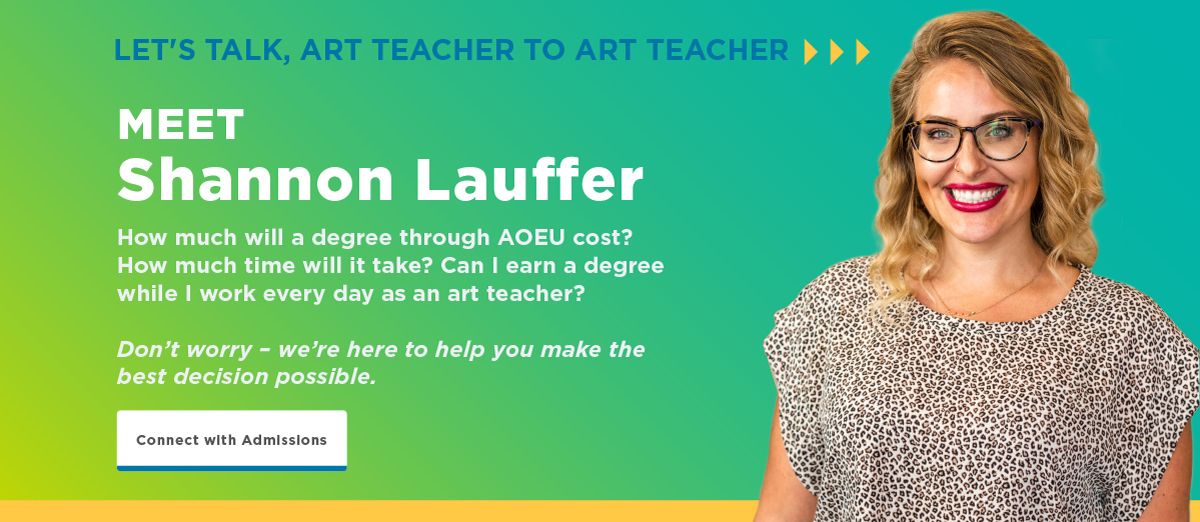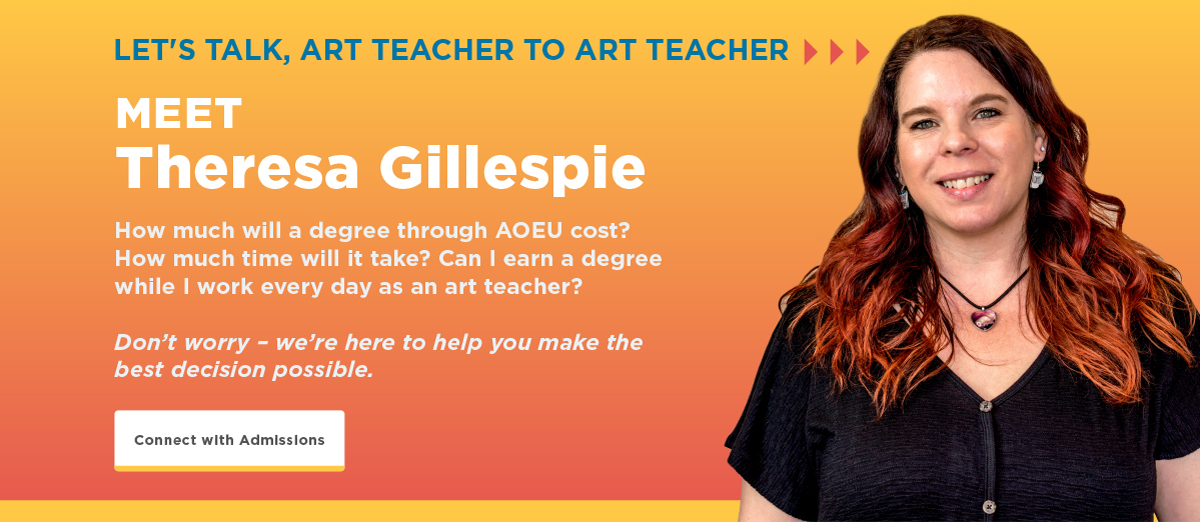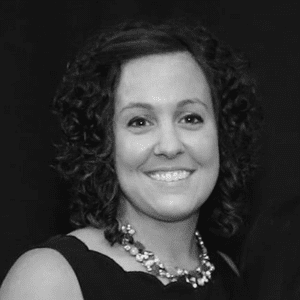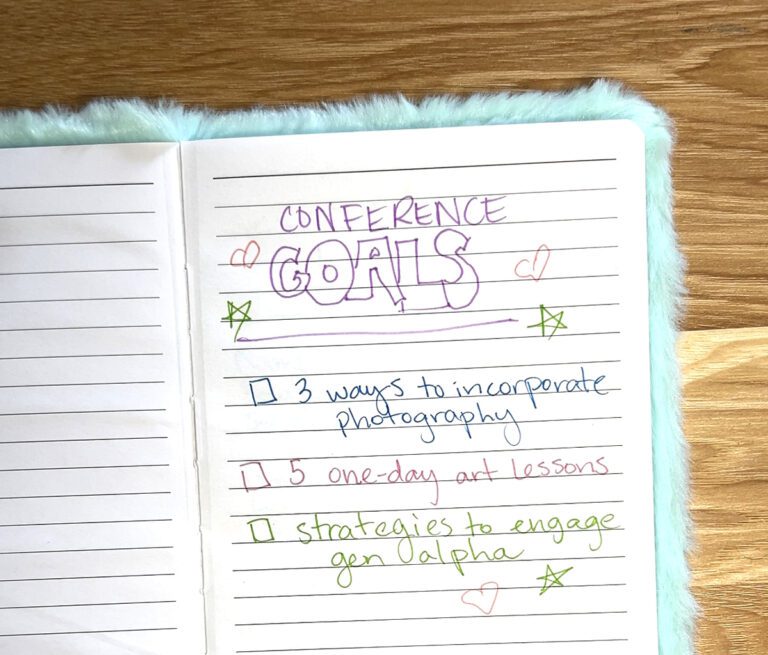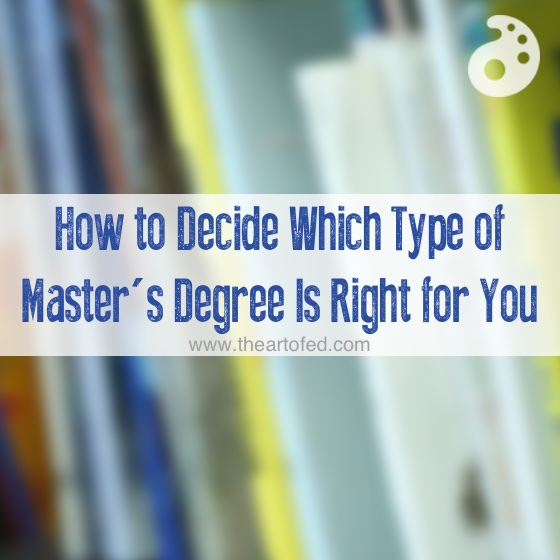
I never questioned whether I would get my master’s degree. It was never if but when. Some of my colleagues were in the same position, so we began to research programs together.
As we did, we became stuck on this important question:
Do we spend the time and the big bucks to get a degree in Art Education or get a Master of Arts in General Teaching through a local college?
One of my colleagues sat on this big question for years because she didn’t want to pay for an Art Ed degree, but she really wanted something art-specific. I know she is not the only one.
I took the now-or-never approach and signed up with a local college to get a Master of Arts in Teaching. For me, the process was positive. I was able to complete the degree in my own timeframe and learned things I could apply in my art room. I got to choose a thesis that was relevant to art ed, so in that regard, I didn’t feel shortchanged at all.
In addition, I was able to squeeze in some personal choice with my coursework.
Because I had the opportunity to transfer in a set number of electives, I went looking for local classes that were art or leadership-specific to meet my personal interests. In reality, these types of classes were tricky to find, which was one of the motivations for creating AOEU. After my experience, I wanted to provide options for teachers who were in the same position that I was.
Looking back, the multiple perspectives I got from some of my general education classes in philosophy, assessment, diversity, and leadership, made me a better, more rounded teacher. I was able to take ideas from general education and look at my profession in a new way.
Abby Schukei, blogger at Art. Eat. Tye Dye. Repeat. actually chose to get her master’s degree in IT (information technology) which doesn’t seem traditional for an art teacher. She says, “In all honesty, I chose to pursue a master’s program in IT rather than Art Education because I felt it would greater benefit me. It has benefited my instruction as a teacher because I’m always discovering new ways to present and experience the same content. I also love the fact that the program is cross-curricular and enables me to transition other disciplines into my teaching with great ease. Technology is a burden and a blessing. We’ll always be two steps behind, but it will continue to transform what I do in my art classroom.”
Sometimes we are made to feel inferior or bad if we don’t pursue a degree in art education. Many options are equally as fulfilling for different reasons.
I have compiled a handy list of pros and cons for you to to consider as you make this decision for your professional future.

The Pros and Cons of an Art Ed Master’s Degree
Pros
– Your professors and fellow students are all art teachers!
– The curriculum is laser-focused on art education.
– Online programs are becoming more prevalent and accessible each year.
Cons
– The cost is usually quite a bit higher for these programs and many are not online.
– The timeframe and class schedule is usually decided for you and spaced out over a longer period of time.
The Pros and Cons of a General Education Master’s Degree
Pros
– You can usually work at a faster pace in these programs and plan your own course schedule.
– Many of the programs transfer in electives, so you can still have art-specific classes.
– You are able to gain multiple perspectives from teachers in other disciplines or choose a specialized degree focusing on leadership, curriculum development, or technology.
Cons
– Your professors and colleagues usually know nothing about art.
– The required classes will likely not be art-specific.
As for my colleague who waited, ironically, she ended up going through the same program I did several years later and took some AOEU classes as her electives. She had a positive experience. Our educational partner, Morningside University, also has a similar program that allows AOEU classes as electives. If you are interested in this, you can learn more here.
The moral of the story is this: If you want to get your master’s degree, don’t wait. It’s not exactly about where you get your degree, it’s about what you as an individual bring to the table. It’s your attitude and drive. It’s how you apply the learning. If you wait for the perfect program to come along, you might be waiting forever. In my eyes, there is no “right time.” If you have a goal, find a way to make it happen and start taking those first baby steps to get there!
What are some of your hesitations about getting a master’s degree?
What are some pros and cons you’ve found from either type of program?
Magazine articles and podcasts are opinions of professional education contributors and do not necessarily represent the position of the Art of Education University (AOEU) or its academic offerings. Contributors use terms in the way they are most often talked about in the scope of their educational experiences.
